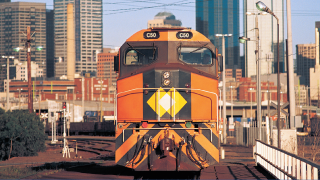West Coast Collaborative Locomotives and Rail Sector Workgroup

Summary
The Locomotives and Rail sector like many of our other WCC sectors help move the goods we need. Yet this sector poses a particular risk to communities as people often live near rail yards. Thus, it is important to focus on reducing locomotive and rail emissions for the sake of community health. This page provides information on current and potential emissions reduction projects in the West Coast region. Efforts to reducing rail emissions focus on topics that include reducing emissions through idle reduction, emerging technologies, exploring innovative financing mechanisms, leveraging federal funds, and sharing lessons learned regarding technologies and best practices. West Coast Collaborative (WCC) also funds a variety of Locomotive and Rail Projects and administers EPA funding programs such as the Diesel Emissions Reduction Act (DERA) program.
Funding Opportunities
The Consolidated Rail Infrastructure and Safety Improvements (CRISI) Program, through the U.S. Department of Transportation's Federal Railroad Administration, provides funding for rail projects that improve the safety, efficiency, and reliability of intercity passenger and freight rail including projects that rehabilitate, remanufacture, procure, or overhaul locomotives for emission reductions.
Resources
- EPA's SmartWay
Provides information on a voluntary program that aims to augment supply chain sustainability by measuring, benchmarking, and improving freight transportation efficiency. - EPA's Ports Initiative
Provides resources for ports, which may be relevant to port connected railways, including technical resources, news, funding opportunities, best practices for clean air, and more. - Department of Transportation Federal Railroad Administration
The Federal Railroad Administration's (FRA) supports the nation’s rail network through a variety of competitive and dedicated grant programs. FRA provides technical assistance and training to grantees and stakeholders as well as conducts ongoing monitoring of grants throughout the grant lifecycle. - California Air Resources Board "Reducing Rail Emissions in California" site
The California Air Resources Board (CARB) has developed and implemented a number of measures to understand and reduce locomotive and railyard emissions, including studies, regulations, enforceable agreements, and funding of clean technology. - Puget Sound Clean Air Agency's Northwest Ports Clean Air Strategy
The Northwest Ports Clean Air Strategy is a voluntary collaboration among Northwest Seaport Alliance, Port of Seattle, and Port of Tacoma in the U.S., and Vancouver with a vision to reduce -- and ultimately eliminate -- seaport-related air pollutant and greenhouse gas emissions throughout the Georgia Basin-Puget Sound airshed.
Disclaimer
Reference to any specific commercial product, process, or service, by trade name, trademark, manufacturer, or otherwise, does not constitute or imply the endorsement, recommendation, or favor of West Coast Collaborative or its partners, including the United States Government.

